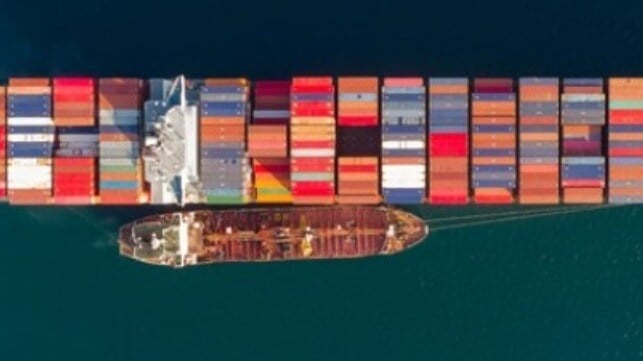47 Nations Back ICS Plan for Global Bunker Levy

With support from shipping's largest business association, 47 nations have submitted a revised, detailed proposal for an IMO carbon levy on bunker fuel. If approved at the next meeting of the Marine Environment Protection Committee in April, it would be the first UN-administered global carbon tax of any kind, with implications for energy stakeholders inside and outside of the maritime sector.
“The industry fully supports the adoption by IMO of a GHG pricing mechanism for global application to shipping. The joint text put forward by this broad coalition is a pragmatic solution and the most effective way to incentivize a rapid energy transition in shipping," said ICS secretary general Guy Platten, describing the text as "hard-fought."
At MEPC 82 in October, IMO discussed but did not finalize a package of "mid-term measures" to encourage shipping to reduce its carbon emissions. The most controversial - and proponents say, the most necessary - parts are "economic elements," meaning a global tax on fossil bunker fuel and subsidies for green fuels. Without a fee structure to tilt the price balance in favor of low-carbon fuels, the new green options will not be commercially competitive with bunker fuel, clean-shipping advocates say.
After MEPC 82, IMO recommended that the shipping community continue to work with member states to develop a consensus proposal. Together with the International Chamber of Shipping and the European Commission, a coalition of 47 states came up with what it believes to be the most mature, vote-ready measure yet - if it can gain traction with petroleum-exporting nations.
Under the proposal, ships would begin paying a levy for their annual bunker fuel use beginning in 2028. The text contemplates a surcharge for noncompliance, though details of the penalty are not yet fully formed. The levies would be collected by an IMO-administered fund overseen by MEPC and governed by a diverse international board.
Beginning in 2028, ships that use green fuels would be eligible for a financial reward, calculated based on their usage data. The reward would be paid from the IMO-administered fund using the same revenues collected from fossil-fueled ships, effectively cross-subsidizing green fuel usage by taxing fossil bunkers. Additional funds would go to green-fuel research and to helping developing states make the transition to green shipping fuels.
The initial amount of the levy will be determined in further discussions, but ICS suggests that it would fall in the range of $60-300 per tonne of bunker fuel. Unlike most carbon tax policy proposals, the fee would not ratchet upwards automatically on a set implementation timetable through 2050: Instead, it would be reviewed and voted upon by all nation-state members of MEPC every two to five years, requiring political agreement to secure each incremental increase.
The list of supporters includes several prominent shipping nations - like Japan, Greece, and the largest flag registries - but many key players are not represented. "While a large number of governments now support a universal flat rate GHG contribution by ships – or something similar – a minority of governments continue to have concerns," noted Platten, without naming any states. "Working in co-operation with all IMO Member States we will do our best to allay such concerns during the final stages of these critical negotiations about regulatory text."
